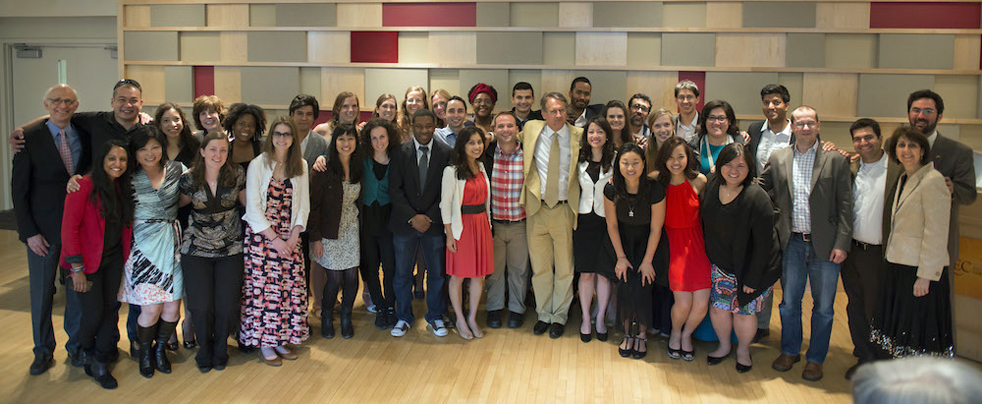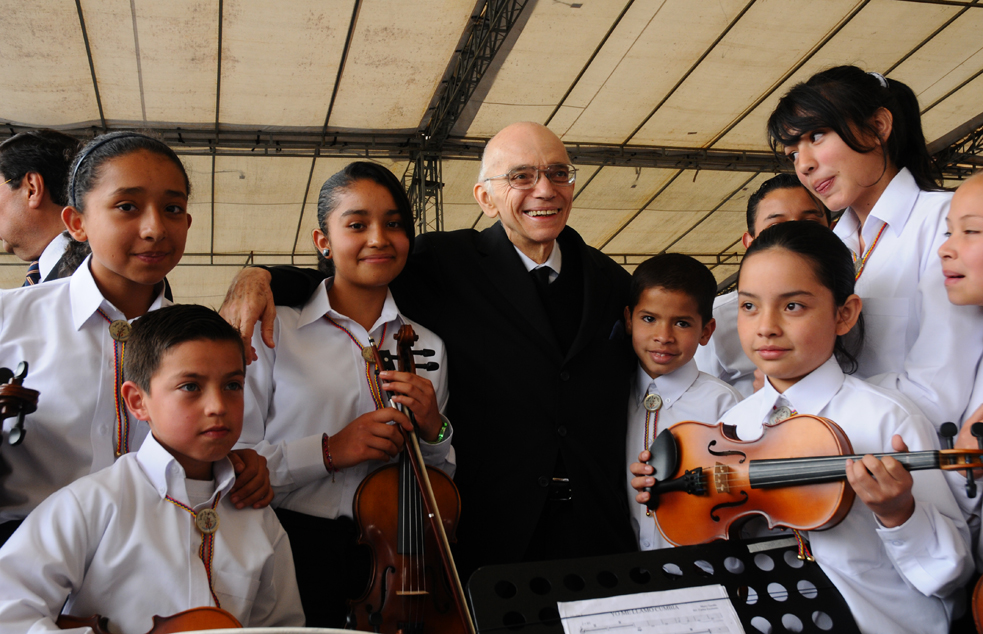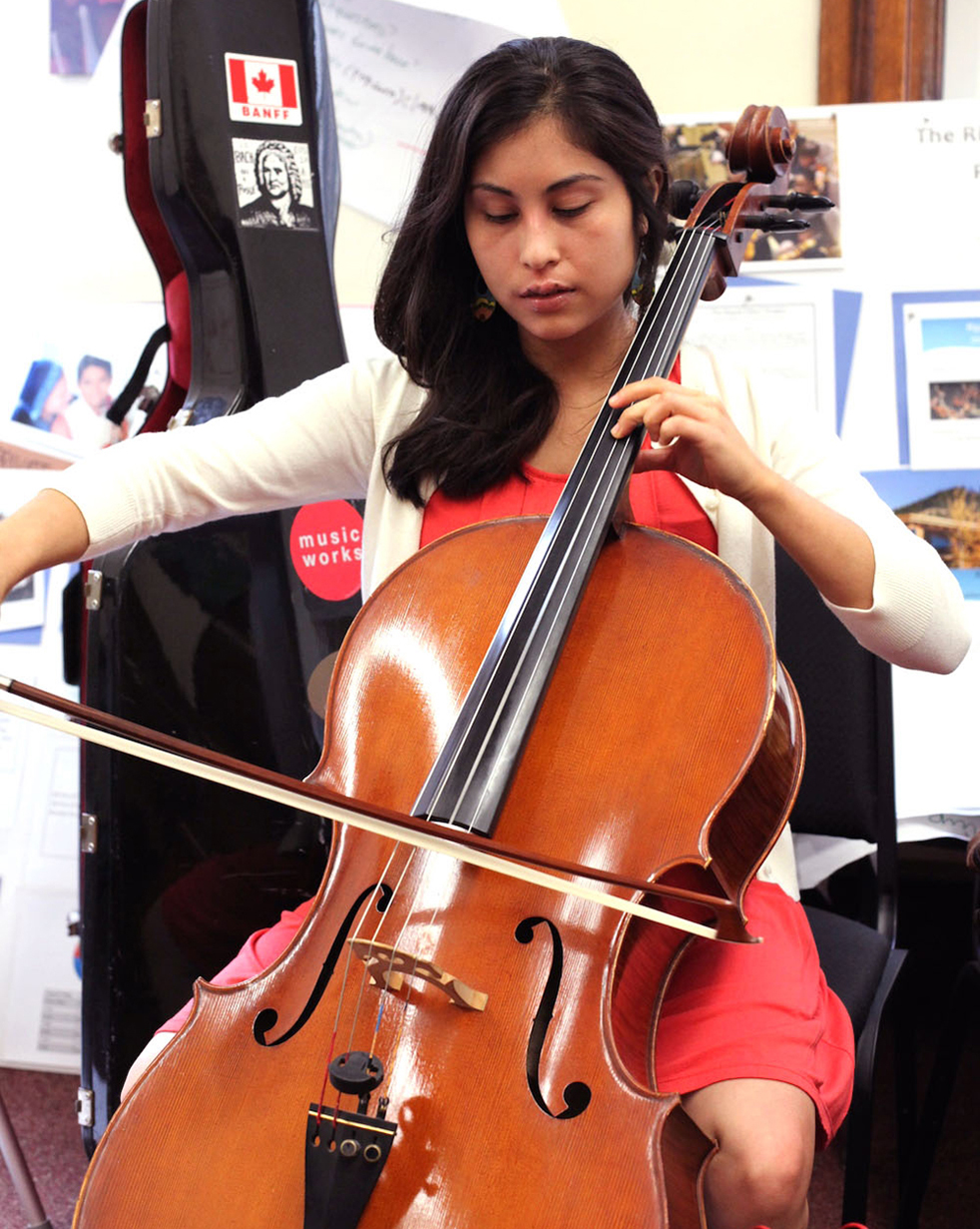
Jose Antonio Abreu made a TED Prize wish in 2009 to train 50 musicians to start youth orchestras in their community. The final class of Sistema Fellows graduated this month. Photo: Andrew Hurlbut at NEC
On a drizzly spring day in Boston earlier this month, three dozen musicians mingled in the President’s Library of the New England Conservatory (NEC), one of the most prestigious music institutions in the country. The weather did not dampen the infectious enthusiasm in the room. After all, 10 of these musicians were about to mark a milestone: graduation from the competitive Sistema Fellows Program, an initiative born out of El Sistema and made a reality by the TED Prize.
El Sistema is a network of youth orchestras founded by pianist and conductor Jose Antonio Abreu in 1975. Officially called the “National System of Youth and Children Symphony Orchestras of Venezuela,” El Sistema (“the system”) teaches orchestral instruments to Venezuelan children from poor and crowded barrios. In some cases the kids become income-earning musicians (like LA Philharmonic conductor Gustavo Dudamel); but in all cases kids learn lessons about citizenship, responsibility and working together. In 2009, Abreu won the TED Prize and wished to bring El Sistema to the United States. He proposed a training program to equip 50 young musicians to lead youth orchestras in their communities. The 10 Fellows about to graduate represented the program’s final class of musicians trained not just to play, but to lead, plan, fundraise and create sustainable local music programs.
The energy and excitement were palpable as the soon-to-be graduates munched on Middle Eastern food and talked with Fellows from previous years, who came from as far away as Alaska to support the final class. The 50 Fellows are a tight-knit group, bonded by their love of music, but also by the fact that they’d endured a challenging 9-month fellowship; the impact was clear even as they struggled to put the experience into words. The general consensus was that the program “grew” them in more ways than they could have expected.
“One of the things I realized here is that being a musician, you have to know more than just how to play your instrument,” said Laura Jekel, a cellist who joined the Sistema Fellows Program in 2010. “That never came up for me in any of my conservatory training in the past. It was always just play, play, play.”
The Sistema Fellows Program, housed at the NEC, was indeed about more than musicianship. The intensive curriculum focused on leadership and community development, and included a month‐long residency in Venezuela. During this residency, the Fellows saw El Sistema in action and got to know Abreu.

Jose Antonio Abreu has created a web of youth orchestras across Venezuela, and now across the United States. Photo: El Sistema
Abreu’s vision for El Sistema, too, is about more than making music — his vision has always been more about creating community. For him, an orchestra brings people together, and the US-based Sistema Fellows are ambassadors for his big-picture thinking. They 50 of them landed in the program because of their passion for playing music, teaching music and using music to foster understanding between people of diverse backgrounds.
“I’ve always had a real interest in combining music with social change and a passion for building strong communities, even in high school,” said Andrea Landin, a California native and cellist who graduated from the program last year. “I would like to see orchestras better reflect the community, and move away from this idea that it’s a niche thing. An orchestra should be seen as a resource, not as an elite institution.”
A year after graduating, Landin is now the Education Manager at New West Symphony Harmony Project in Ventura, California, which teaches music to 95 at-risk students. They practice in a funky art space, peppered with artwork by local artists, and join up with local organizations to put on jazz jam sessions.
Meanwhile, cellist Jekel is relishing working with kids in Ohio, where she is the Program Director at Music for Youth in Cincinnati. “I live in the same neighborhood where my program is, and I love seeing kids who are in the program walking up and down the street or in the supermarket with their families,” she said. “It’s not outreach at all. I feel like I’m part of the community; I’m just part of the neighborhood.”
The graduation ceremony began in the cozy quarters of the NEC. During the two-hour ceremony, each 2014 Fellow took a turn at the podium, sharing a memory of the past year. There was a mixture of laughter and crying, and a flurry of inside jokes.
Eriel Huang, about to graduate, teared up as she gave her graduation speech, with her mom watching from Cape Town via Skype. Huang, who was born in Taiwan and raised in South Africa, played the electric violin in a touring band before joining the program. “Music for me has always been about sharing. It was never about the performance, but about bringing music to all types of communities and being able to share in that joy,” she said. Through the Fellows program, she developed an interest in mediation and diplomacy, and hopes to pursue a career in cultural diplomacy, possibly at the United Nations.

Andrea Landin doesn’t just play beautiful music. She teaches kids in California to love it too. Photo: Natasha Scripture
In the halls of the New England Conservatory, the distant sound of an aria from a Bellini opera blends with a Mozart sonata being brought to life by a student on a Steinway. “In a place like this, it’s easy to think of music as just playing at a higher level, but we want to use it for another purpose,” said Alvaro Rodas, a native of Guatemala and 2010 Fellow who plays percussion.
Rodas now runs the Corona Youth Music Project in Queens, New York. The program is for children between the ages of 4 to 14, and begins with a “pre-orchestra semester,” in which kids use plastic buckets as drums. Chorus classes at the program are taught in English, though the kids predominantly speak Spanish.
In Venezuela, El Sistema has grown exponentially over its 40-year history. It now includes 685 youth, child and infant orchestras — with more than 400,000 young people getting a free classical music education. In the United States, this idea is just starting to take off, thanks to Abreu’s TED Prize wish. These Sistema Fellows are working with at-risk communities in 20 cities. In 2010, when the first class of Fellows entered the field, their programs served about 600 children. Today, the Fellows work with more than 5,000 children through their programs. And with the final class, the number will continue to grow.
The five-year fellowship program may have run its course, but growth for this idea is still very much a possibility. One intriguing thought for the Fellows is that a child in their program may be inspired to do this kind of work, continuing the cycle of growth. “I would love to see my program become self-sustaining in the way that the kids grow up and come back and teach. I want to create a culture of giving back,” said Landin, as she runs her fingers along her cello case.
The NEC hopes to continue the momentum of the program as well. They’ve created the Sistema Fellowship Resource Center, dedicated to the ongoing training of the program’s alumni.
One interesting byproduct of Fellowship is that it’s allowed for cross-cultural exchanges between the US and Venezuela, with the El Sistema program counterparts in both countries talking to each other and working together to ensure the program’s sustainability. At the graduation, Rodrigo Guerrero, Deputy Director of International Development at the Fundacion Musical Simon Bolivar, which runs El Sistema, clinked plastic cups of soda with the Fellows. “Seeing the Fellowship come to an end is sad. But it’s also a moment of great pride for all the institutions involved—knowing that this field has been created and that it’s growing every year,” says Guerrero. “Thousands of children around the US are getting musical instruction—with the idea of social action, of utilizing music as way to bring communities and families together, of engaging them actively in the community.”
As the Fellows stepped to the podium one by one to deliver their graduation speeches, their passion beamed through. Each sounds thoroughly excited to spread the magic of music as far as it can go. Abreu’s TED Prize wish, put simply, was to teach 50 passionate people how to influence lives through music. The only question is how many they’ll teach from here.
Comments (16)